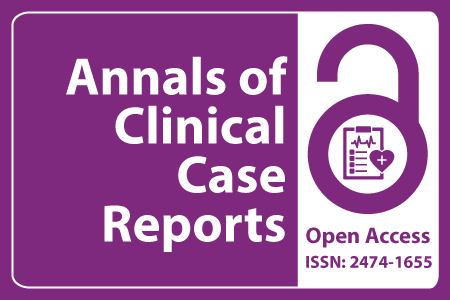
Journal Basic Info
- Impact Factor: 1.809**
- H-Index: 6
- ISSN: 2474-1655
- DOI: 10.25107/2474-1655
Major Scope
- Sexual Health
- Gastric Cancer
- Psychiatry and Mental Health
- Urology Cases
- Ophthalmology
- Pharmacology and Therapeutics
- Allergy & Immunology
- Vascular Medicine
Abstract
Citation: Ann Clin Case Rep. 2024;9(1):2638.DOI: 10.25107/2474-1655.2638
Surviving Aluminum Phosphide Poisoning Induced Cardiotoxicity - A Case Report
Gebray HM* and Chekol AL
Department of Internal Medicine, Woldia Comprehensive Specialized Hospital, Ethiopia
*Correspondance to: Habtamu Mesele Gebray
PDF Full Text Case Report | Open Access
Abstract:
Introduction: Aluminum phosphide which is a cheap and commonly used rodenticide is also an effective solid fumigant that is frequently used for grain preservation. The pill contains around 44% inert elements to avoid disintegration of the tablet, ammonium carbonate, while the rest (about 56%) is aluminum phosphide. Because it is freely available in the market and accessibility is not controlled in developing countries, it is one of the commonly used agents for self-poisoning in different parts of the developing world. Case Report: We presented a 48 years old black African female patient who was taken to private clinic after 6 h of intentional ingestion of two tablets of aluminum phosphide. She was presented with restlessness of 03 h duration with confusion. She had 06 episodes of vomiting of ingested matter. Upon examination, the patient was drowsy, pale, cold and clammy. She had non-recordable blood pressure and radial pulsation. Glasgow Coma Scale was 14/15. Routine lab investigations and initial Electrocardiogram were normal. Six hours after Intensive Care Unit admission, the Electrocardiogram showed atrial fibrillation with fast ventricular response, ST segment elevation and inverted T-waves. Cardiac troponin level was elevated. With the diagnosis of acute Aluminum Phosphide Poisoning with Cardiotoxicity (Acute Myocardial Infarction), hospital-based protocol for a hypotensive patient with aluminum phosphide poisoning was administered and medical treatment of myocardial infarction was given. These measures ultimately resulted in a complete resolution of clinical findings and laboratory derangements. Conclusion: Exposure to phosphine gas released from ALP fumigants increases the risk of major morbidity and mortality. The mortality due to ALP poisoning is very high and variable. The use of magnesium sulphate to reduce cardiac arrhythmias and mortality is well documented but there is no uniformity in dose and frequency of its administration worldwide.
Keywords:
Aluminum phosphide; Poisoning; Rat poison; Cardiotoxicity; Magnesium sulphate; Pesticides
Cite the Article:
Gebray HM, Chekol AL. Surviving Aluminum Phosphide Poisoning Induced Cardiotoxicity - A Case Report. Ann Clin Case Rep. 2024; 9: 2638..













